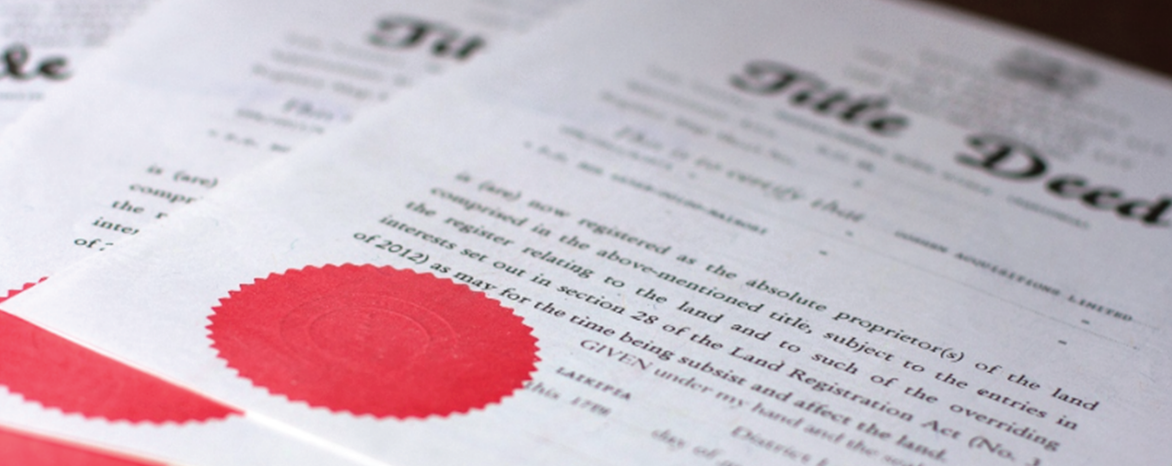Owning land in Kenya remains one of the most secure and valuable investments. However, before making any purchase, it’s crucial to understand the role of title deeds and how they impact land ownership in Kenya. A title deed is more than just a piece of paper—it is legal proof that you are the rightful owner of the land. Without it, your investment could be at risk.
Unfortunately, many land buyers fall into costly traps due to ignorance or misinformation about title deeds and property laws. That’s why, at Justhomes Kenya, we believe that knowledge is your first line of defense in the real estate market. Whether you’re a first-time buyer or a seasoned investor, knowing the types of title deeds, how to verify them, and the transfer process is essential. In this article, we’ll walk you through everything you need to know about title deeds in Kenya—from their types and verification process to common pitfalls to avoid
What is Land Ownership and Types of Land Ownership?
Land ownership in Kenya refers to the legal rights an individual, group, or entity holds over a specific parcel of land. These rights allow the owner to use, lease, sell, or develop the land as per the country’s laws. Before buying land, it’s essential to understand the different types of land ownership to avoid legal disputes or property loss.
In Kenya, the main types of land ownership include:
-
Freehold Ownership: This is the most complete form of ownership. The owner has unlimited rights to use the land for life and can transfer it to heirs.
-
Leasehold Ownership: In this case, the land is leased for a period (usually 33, 50, or 99 years). The government or a private entity still owns the land.
-
Customary Ownership: Land is managed according to traditions and community practices. It’s common in rural areas.
-
Public Land: Land owned and managed by the government for public use such as roads, parks, or schools.
Platforms like BuyRent Kenya provide detailed property listings, often indicating whether a title is freehold or leasehold. Justhomes Kenya, via the Justhomes App, helps users verify land ownership and type before committing to a purchase. Meanwhile, buyers using Jiji Kenya must be extra cautious—always confirm ownership documents and ensure you work with verified agents.
Ultimately, understanding land ownership types protects you from fraud and ensures you make informed investment decisions in Kenya’s growing real estate market.
Types of Title Deeds and Their Importance
A title deed is an official legal document that proves land ownership in Kenya. Before buying any property, it’s vital to understand the types of title deeds and why they matter. The type of deed you hold determines your rights over the land and its long-term security.
In Kenya, the most common types of title deeds include:
-
Freehold Title Deed: Grants absolute ownership with no time limit. Ideal for residential and agricultural land. Owners can develop or sell at will.
-
Leasehold Title Deed: Grants ownership for a limited period—typically 33, 50, or 99 years. Common in urban areas where land is leased from the government.
-
Sectional Title Deed: Used for individual units in developments like apartments. It covers both the unit and shared spaces.
-
Certificate of Lease: Similar to a leasehold title but often used for smaller plots, especially in county-regulated zones.
The importance of title deeds cannot be overstated. They offer:
-
Legal proof of ownership
-
Security for loans or mortgages
-
Protection against land fraud or disputes
-
Easier resale or inheritance processes
Leading property developers like Optiven, OneEleven Properties, and Username Investments ensure that all their plots come with clean, verified title deeds. They work closely with land registries and surveyors, giving buyers peace of mind.
At Justhomes Kenya, we help you verify title documents directly through the Justhomes App, ensuring that your investment is both legal and secure. Whether you’re buying through these developers or browsing listings, understanding your title deed is key to safe property ownership.
Acquiring a Title Deed in Kenya
Acquiring a title deed in Kenya is a vital step in confirming legal land ownership. A title deed not only protects your investment but also gives you peace of mind. Whether you are buying land for residential use or investment, the process should be handled carefully and in line with legal procedures.
Here’s a simplified process of acquiring a title deed:
-
Step 1: Conduct a Land Search
Visit the Ministry of Lands or use the eCitizen platform to verify the land’s ownership status and ensure it’s free of encumbrances. -
Step 2: Sign a Sale Agreement
The agreement should be prepared and signed in the presence of lawyers from both parties. -
Step 3: Pay the Agreed Amount
Ensure payment is made after due diligence and with proper documentation. -
Step 4: Land Transfer & Registration
The seller will lodge transfer documents at the Land Registry. You’ll pay stamp duty based on land value before registration. -
Step 5: Receive the Title Deed
Once registered, the title deed is issued in your name.
Reputable developers like simplify this process for buyers. They provide land with ready or processing title deeds and assist in handling all legal paperwork.
Moreover, the Justhomes App by Just Group Ltd. connects you with trusted agents and legal experts who guide you step-by-step through the acquisition journey. This ensures you get genuine property and a legally binding title deed—faster and safer.
Challenges in Land Ownership and Title Deeds
While land ownership in Kenya is a valuable investment, it comes with its fair share of challenges. Many buyers face issues that delay title deed issuance or lead to property disputes. Understanding these challenges helps you stay alert and make informed decisions.
Some of the common challenges include:
-
Fraudulent Land Sales
Some sellers present fake title deeds or sell land that does not belong to them. Without proper verification, buyers risk losing money. -
Double Allocation
Especially common in group ranches or unplanned areas, double allocation occurs when land is sold to multiple buyers. -
Delayed Title Processing
Title deed issuance can take months or even years due to backlogs or missing documentation at the land registry. -
Boundary Disputes
Inaccurate surveys or lack of proper fencing often result in ownership disputes with neighbors. -
Lack of Due Diligence
Many buyers fail to perform land searches or work with legal experts during the buying process.
To overcome these hurdles, buyers should always work with credible developers like Optiven, OneEleven Properties, and Username Investments. These companies are known for transparency, and they offer land with valid, verifiable title deeds.
The Justhomes App by Just Group Ltd. also provides trusted professionals who help verify documents, conduct land searches, and ensure smooth ownership transfers.
Conclusion
Land ownership in Kenya is rewarding, but only when done right. By understanding the process, knowing the types of title deeds, and working with trusted partners like Justhomes, Optiven, OneEleven, and Username, you safeguard your investment. Use the Justhomes App today to begin your land ownership journey with confidence.


